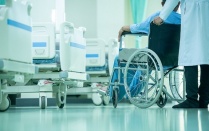
March 2022
Welcome to the first edition of the Buffalo Pharmacy Bulletin. This new outreach piece, replacing our quarterly Dean’s eNotes publication, will provide a platform where I can share with you my thoughts and reflections on current trends in health care, pharmacy and pharmaceutical sciences education, and advances in the clinical and bench sciences.
I hope you find this content interesting, relevant and at times, thought provoking. The best way to ensure we can support and mentor our future pharmacists and research scientists is to make sure we are reviewing and discussing what is currently happening in the dynamic and ever-changing world we live in.
I look forward to our continued interactive dialogue on these important topics.
Gary M. Pollack, PhD '84
Dean and Professor
Health Equity: The face of the health care workforce must begin to mirror the communities they serve
Equitable access to, and equivalence of outcomes of, healthcare services, continue to be a significant problem in the US. While we often think of this issue in terms of how communities of color may be at a significant disadvantage (and they undeniably are; the Kaiser Family Foundation reported that the age-adjusted risk of SARS-CoV-2 infection was roughly three times higher, and the risk of death from COVID-19 more than two times higher, for people of color as compared to the White and Asian populations), the problem cuts across multiple domains.
Rural and economically disadvantaged communities suffer from inadequate access to services. Shockingly, more than 80% of counties in the US can be categorized as “health care deserts”, with half of these being “pharmacy deserts”. The lack of access to care is associated with lower median household income, lack of access to health insurance, and lack of access to the internet. Writing in the NY Times, the physician Carl Erik Fisher, who specializes in drug addiction, makes the case that drug misuse/abuse is not always a problem of addiction, but often drug problems are “strongly influenced by health inequities and injustice, like a lack of access to meaningful work, unstable housing and outright oppression”. Addiction treatment can also be beyond the economic reach of many.
Immigrant and LGBTQ communities all can suffer from sub-optimal care even when options are plentiful. Interacting with a health care provider who speaks the same primary language, or who can relate directly to a patient’s lived experience, significantly improves health care outcomes. Recently, deficiencies in care have been noted for gay and bisexual men with prostate cancer, presumably due to caregivers’ lack of understanding of specific physical and emotional issues facing this population.
There are hopeful signs that the situation may be changing. For example, the number of Black students pursuing a medical degree increased by more than 20% in 2021. The pharmacy profession is actively engaged in the social justice conversation as it pertains to healthcare. And the disruption caused by the pandemic, coupled with our turbulent political times, has kept important issues related to structural racism and an equitable and inclusive society at the forefront.
The hard truth, though, is that we will only be able to provide the quality of care everyone deserves when we have a healthcare workforce that mirrors the communities it serves. We will only be able to create such a workforce if potential students see themselves, their concerns, and their life experiences reflected in the faculty who will educate them and serve as their role models and advocates. Solving this problem has been elusive and remains one of the greatest challenges our healthcare ecosystem must face.

Low income, male gender or urban setting each tied to higher risk of hospital readmission
Patients who earn less than $38,000 per year, identify as male or were treated in an urban hospital have a higher risk of being readmitted to a hospital within a month of discharge, according to a new University at Buffalo study.
NIH Clinical Loan Repayment Program Award aims to decrease health care disparities
Nicholas Smith, BS ’15, PharmD ’18, MS ’18 and PhD ’21, assistant professor of pharmacy practice, is the recipient of a National Institutes of Health (NIH) Clinical Loan Repayment Program (LRP) Award from the National Institute of Allergy and Infectious Diseases for his project “Establishing Next Generation Therapeutic Drug Monitoring by Incorporating Special Patient Populations and Mechanism-based Pharmacodynamics,” which is focused on developing freely available dosing software tools to individualize therapy in the hospital setting.

Thank you for reading our March 2022 edition of the Buffalo Pharmacy Bulletin. Please stay in touch! Send us updates on your own personal and professional accomplishments by filling out our alumni update form.
Regards,
Gary Pollack, PhD '84
Dean and Professor